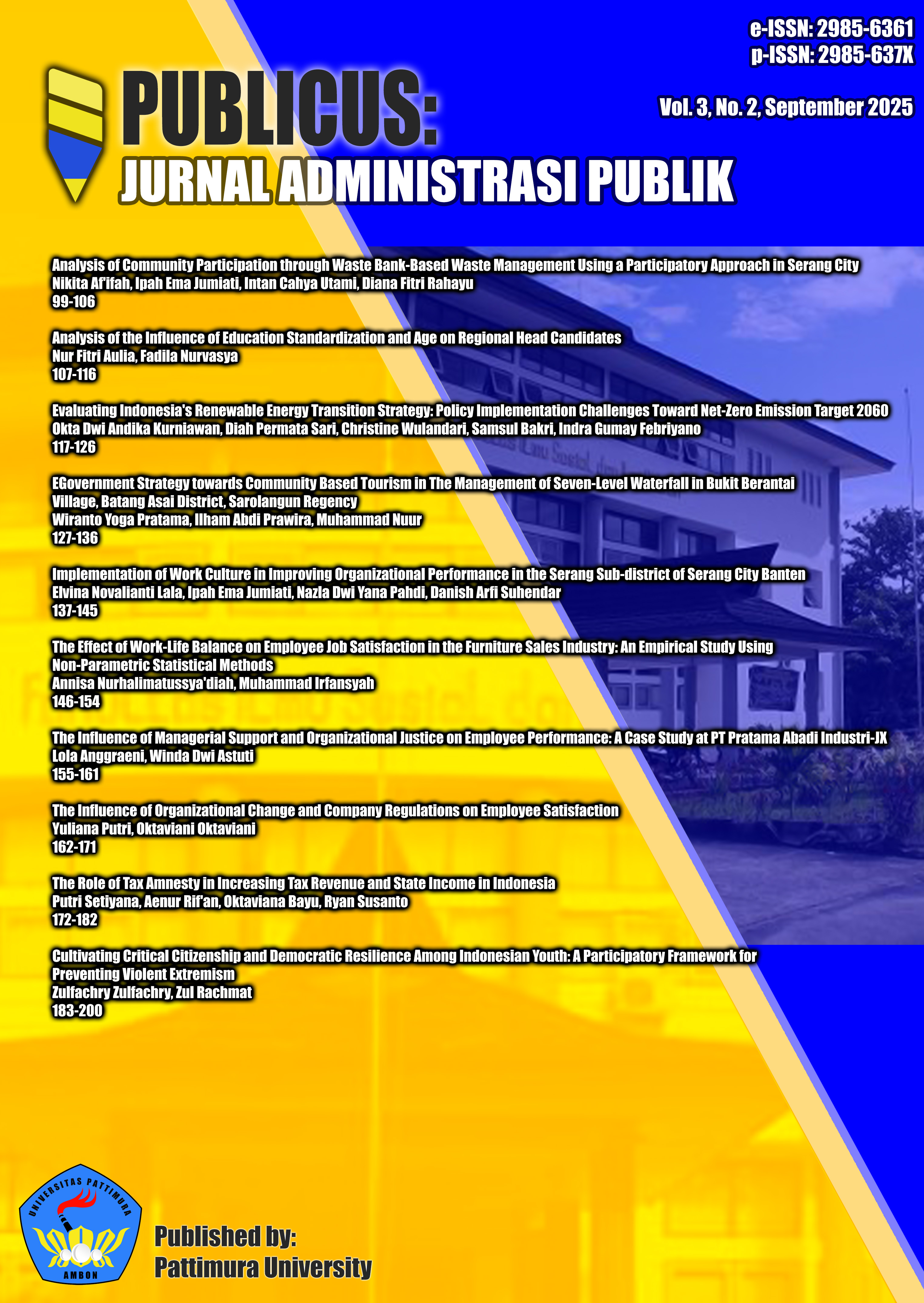Analysis of Community Participation through Waste Bank-Based Waste Management Using a Participatory Approach in Serang City
Abstract
Along with the increasing population and changes in people's increasingly consumptive lifestyles, the volume of waste produced every day is increasing. The pile of waste throughout Indonesia in 2023 that is well managed is 24,266,750.68 tons/year, while waste that is not well managed is 15,850,104.69 tons/year. Banten Province is ranked fifth as the largest waste producer in Indonesia. As much as 2.6 tons/year are produced from 7 districts/cities in the region. This indicates that low public awareness of environmental cleanliness is one of the main factors causing waste accumulation. However, steps are needed to overcome the low public awareness of environmental cleanliness as the cause of this waste accumulation. The method used in this study is a literature study. Data collection through related references, ending with reading in detail and recording relevant materials to support the research analysis. This data was analyzed using a participatory approach, which aims to identify community participation, challenges faced, and the impact of policies on improving the quality of waste banks. The Waste Bank Program is an effort to reduce waste accumulation by providing incentives to the community. The Waste Bank functions not only to accommodate waste, but also to manage waste according to the needs of the community.
Downloads
References
Abdulnabi Ali, A., Golbert, Y., Reksa, A. F. A., Kretzer, M. M., & Schweiger, S. (2023). Transformative Solutions in the Global South: Addressing Solid Waste Management Challenges in Jakarta Through Participation by Civil Society Organizations? In Environmental Governance in Indonesia (pp. 329–351). Springer International Publishing Cham.
Budiyarto, A., Clarke, B., & Ross, K. (2025). Overview of waste bank application in Indonesian regencies. Waste Management & Research, 43(3), 306–321.
Fatmawati, F., Mustari, N., Haerana, H., Niswaty, R., & Abdillah, A. (2022). Waste bank policy implementation through collaborative approach: comparative study—Makassar and Bantaeng, Indonesia. Sustainability, 14(13), 7974.
Hapuarachchi, H. (2024). Community participation in municipal solid waste management: Special reference to Gampaha municipality. International Journal of Science and Research Archive, 11(2), 1153–1158.
He, Y., Zaremohzzabieh, Z., Rahman, H. A., Ismail, S. N., & Bin-Qiang, J. (2024). Applying participatory research in solid waste management: A systematic literature review and evaluation reporting. Journal of Infrastructure, Policy and Development, 8(5), 1–28.
Hoornweg, D., & Bhada-Tata, P. (2012). What a waste: a global review of solid waste management.
Kalra, N. (2019). Community participation and waste management. In Sustainable Waste Management: Policies and Case Studies: 7th IconSWM—ISWMAW 2017, Volume 1 (pp. 115–123). Springer.
Kurniawan, T. A., Avtar, R., Singh, D., Xue, W., Othman, M. H. D., Hwang, G. H., Iswanto, I., Albadarin, A. B., & Kern, A. O. (2021). Reforming MSWM in Sukunan (Yogjakarta, Indonesia): A case-study of applying a zero-waste approach based on circular economy paradigm. Journal of Cleaner Production, 284, 124775.
Kuseno, D. R., & Waseh, H. (2024). Pemberdayaan Masyarakat terhadap Pengelolaan Sampah melalui Bank Sampah Digital di Kota Serang, Banten. Journal of Geopolitics and Public Policy (JOGPP), 2, 43–53.
Leknoi, U., Painmanakul, P., Chawaloesphonsiya, N., Wimolsakcharoen, W., Samritthinanta, C., & Yiengthaisong, A. (2024). Building sustainable community: Insight from successful waste management initiative. Resources, Conservation & Recycling Advances, 24, 200238.
Manik, E., Dwiyanisa, A., Prawiranegara, G. P., Nuraini, A., Astuti, R. Y., Mardhiyyah, I., & Herawati, O. (2024). Leveraging Waste Banks for Green Environment Sustainability: A Case Study of Community Collaboration in the Gemuruh District, Bandung City, Indonesia. Majalah Bisnis & IPTEK, 17(2), 140–153.
Nisa, Z. K., Agusti, I. D., Winarti, A., Apriliansyah, I., & Zaty, F. P. (2024). Implementation of The Waste Bank Program In Handling Waste In The City Of Serang. Publicus: Jurnal Administrasi Publik, 2(2), 162–174.
Nurikah, E. F., & Fuqron, E. (2022). Bank Sampah Sebagai Upaya Pengelolaan Sampah Berbasis Partisipasi Masyarakat Di Perumahan Taman Banten Lestari Kota Serang Fakultas Hukum, Universitas Sultan Ageng Tirtayasa, Serang. ProBono and Community Service Journal, 1(2), 66–79.
Pretty, J. N. (1995). Participatory learning for sustainable agriculture. World Development, 23(8), 1247–1263.
Rachman, I., Komalasari, N., & Hutagalung, I. R. (2021). Community participation on waste bank to facilitate sustainable solid waste management in a village. Journal of Environmental Science and Sustainable Development, 4(2), 327–345.
Raharjo, S., Matsumoto, T., Ihsan, T., Rachman, I., & Gustin, L. (2017). Community-based solid waste bank program for municipal solid waste management improvement in Indonesia: a case study of Padang city. Journal of Material Cycles and Waste Management, 19(1), 201–212.
Ramadhani, P. A., Reviana, M. N., Regina, K. F., Rahmawati, V., Tasyar, S. N., & Prafitri, N. (2024). Pemberdayaan Masyarakat dalam Pengelolaan Sampah melalui Bank Sampah: Pembukaan Titik Penyaluran Bank Sampah di Kelurahan Gelam Kota Serang. Jurnal Pengabdian Masyarakat Administrasi Publik (APdimas), 1(1), 10–24.
Rimantho, D., Syaiful, S., Nurfaida, & Sulandari, U. (2022). Electronic waste bank model as a solution for implementing circular economy: Case study DKI Jakarta-Indonesia. Frontiers in Built Environment, 8, 1030196.
Saputra, T., Astuti, W., Nasution, S. R., & Zuhdi, S. (2022). Partisipasi masyarakat dalam community participation in. Jurnal Kebijakan Publik, 13(3), 246–251.
Winarno, B. (2012). Kebijakan publik: teori, proses, dan studi kasus: edisi dan revisi terbaru. Center For Academic Publishing Service.
Yandri, P., Budi, S., & Putri, I. A. P. (2023). Waste sadaqah: a new community-based waste-management practice in Java, Indonesia. Sustainability: Science, Practice and Policy, 19(1), 2212510.
Copyright (c) 2025 Nikita Af'ifah, Ipah Ema Jumiati, Intan Cahya Utami, Diana Fitri Rahayu

This work is licensed under a Creative Commons Attribution 4.0 International License.





.png)




